Stock Markets
Tesla stock is no longer a Buy at Goldman Sachs; shares slip

Goldman Sachs analysts downgraded Tesla stock to Neutral from Buy following a massive year-to-date rally in the electric vehicle (EV) maker’s stock.
Still, they raised the price target to $248 per share from the prior $185, reflecting increased EPS estimates and a higher target multiple.
The analysts remain positive on Tesla’s long-term growth potential and competitive positioning. However, the 108% YTD rally (+38% in the last month) means that “the stock now better reflects” Goldman’s bullish stance on the EV manufacturer.
“Overall we believe our view that Tesla is well positioned for long-term growth, given its leading position in the EV and clean energy markets (which we attribute in part to its ability to offer full solutions including charging, storage, software/FSD and services with a direct sales model), is now better reflected in the stock,” they said in a client note.
While the downgrade move was mostly driven by valuation, the analysts also highlighted a “difficult pricing environment for new vehicles,” which they believe will hurt Tesla’s non-GAAP gross margin in 2023.
Overall, Goldman remains “positive on EV adoption, and we continue to see the most investing opportunities among our broader set of suppliers, especially those with higher content to enable the shift to EVs and electrification.”
Tesla stock is down 1.4% in premarket Monday.
Goldman’s new price target implies a downside risk of about 3% relative to Friday’s closing price.
This is the 4th downgrade for Tesla stock in June. Morgan Stanley and Barclays analysts downgraded the stock to Equal Weight last week.
Stock Markets
Suburban Propane director Logan sells $139k in shares
Stock Markets
Stock market today: S&P 500 closes lower, but posts big weekly win
Stock Markets
TD Bank promotes Laura Nitti to retail market president role

 Forex4 years ago
Forex4 years agoForex Today: the dollar is gaining strength amid gloomy sentiment at the start of the Fed’s week

 Forex3 years ago
Forex3 years agoUnbiased review of Pocket Option broker

 Forex3 years ago
Forex3 years agoDollar to pound sterling exchange rate today: Pound plummeted to its lowest since 1985

 Forex3 years ago
Forex3 years agoHow is the Australian dollar doing today?

 Cryptocurrency3 years ago
Cryptocurrency3 years agoWhat happened in the crypto market – current events today

 World3 years ago
World3 years agoWhy are modern video games an art form?

 Commodities3 years ago
Commodities3 years agoCopper continues to fall in price on expectations of lower demand in China

 Economy3 years ago
Economy3 years agoCrude oil tankers double in price due to EU anti-Russian sanctions

































